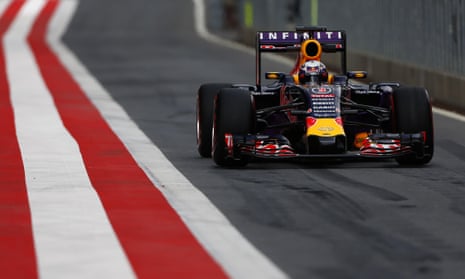Next month, well-heeled punters will flock to the Qatar Goodwood Festival for one of the highlights of the British horse racing calendar. Meanwhile in Paris, a once down-at-heel football club that became home to David Beckham and Zlatan Ibrahimovic is undergoing a metamorphosis into one of the top 10 sporting brands in the world.
In Doha, construction work is well under way on stadiums built to host an endlessly controversial World Cup in November 2022, including the showpiece Lusail Iconic stadium that nestles in a city built from scratch on the outskirts of the Qatari capital. Now, though, the tiny gulf state could be about to add another prime target to its global trolley dash: a major stake in Formula One.
A controlling stake in the sport, built over four decades by Bernie Ecclestone into a global money-spinning machine, has been the subject of rumoured interest over the years from a variety of suitors, including Rupert Murdoch.
But the Guardian understands that a mooted $7bn-plus bid from Qatar Sports Investments (QSI) – which also owns Paris St Germain (PSG) and the global sports broadcasting network beIN Sports – and a billionaire-backed US group is the most serious yet.
QSI is the sports arm of the Qatar investment fund that owns London landmarks including the Shard, Canary Wharf and the Olympic Village. Ecclestone’s 5% share in F1 would be sold alongside 35.5% owned by a venture capital firm CVC, but he would probably stay on in the short-term to run the sport. One of the most immediate motives for such a move might be to ensure that Qatar had its own F1 race in a calendar that includes events in neighbouring Abu Dhabi and nearby Bahrain.
In Britain, a similar rationale has underpinned huge Qatari investment in horse racing. Sheikh Joaan Al Thani, a son of the former emir of Qatar, retains Frankie Dettori to ride his string of horses and now sponsors the festival more commonly known as Glorious Goodwood. Sheikh Fahad Al Thani, meanwhile, established Qatar Racing and Qatar Bloodstock as subsidiaries of the private investment company Qipco, in 2011.
Qipco this year unveiled a £50m sponsorship deal with British racing to underwrite the Champions Series, taking in the biggest flat races of the season, until 2024.
As with Qatar’s other investments, from substantial stakes in Sainsbury’s and Barclays to its push into landmark London properties, the rationale is twofold. As outlined in its 2030 Vision document, the gas-rich state is attempting to prepare for a future beyond its bounteous natural resources and invest globally in industries that can provide an ongoing return.
But it has also chosen some of the most eyecatching brands and properties in the world as a means of putting the country on the map, and projecting “soft power” in an unstable region built on constantly shifting political alliances with its neighbours and the west.
While senior sources in Doha are keen to underline the differences between the investment funds and businesses that have bought into world sport on multiple levels, in a feudal monarchy with a single source of huge wealth the lines inevitably become blurred.
In 2010, Qatar agreed a deal for its charitable Qatar Foundation to take over Barcelona’s sponsorship from Unicef, before a deal for Qatar Airways took effect that has since been renewed.
Sport presses emotional buttons that other investments cannot reach and the strategy is far from haphazard as far as QSI is concerned.
PSG were seized upon by QSI for the untapped potential of the biggest one-club city in Europe. Since then, partly through acquisitions including Beckham, Ibrahimovic, and Edinson Cavani – plus major investment in the stadium and infrastructure – the club has been successfully rebranded. A once down-on-its luck side has been transformed into an upmarket lifestyle choice.
The beIN Sports network, formerly al-Jazeera Sport, has bought up sports rights and launched channels around the world, including the US, and would provide a ready-made outlet for F1. It is the potential prize of combining ownership of a sport with the means of distribution that has attracted interest from Murdoch and others.
It is in this context of a web of complementary investments that the prospective F1 deal should be viewed. Where neighbouring countries have focused on retail or tourism, Qatar (like near neighbour Abu Dhabi, owner of Manchester City) has alighted upon sport and culture as a means of asserting its place in the world.
Sport is also seen as a means of bringing together a fast changing nation that is virtually unrecognisable from a generation ago and where the indigenous population enjoys the highest per capita income in the world, but are outnumbered seven to one by migrant labourers fuelling a construction boom.
Hand in hand with its global investments in sport, Qatar’s then-emir, Sheikh Hamad bin Khalifa Al Thani, succeeded by his son Sheikh Tamim Bin Hamad Al Thani in 2013, agreed to a push to bring the biggest global sporting events to the country. Bids for the 2016 and 2020 Olympics failed at the shortlisting stage.
But despite the climactic challenges in a country, where summer temperatures regularly top 50 degrees, it will host the world cycling road racing championships in 2016 and the world athletics championships in 2019, following money-no-object bids.
Most controversially of all, in December 2010 Qatar won the right to host the 2022 World Cup in a vote that caused shockwaves that are still reverberating. While there is now believed to be some concern at the highest levels over the scrutiny that the World Cup has brought, it has clearly not damaged Qatar’s determination to buy into world sport at the highest level.

Comments (…)
Sign in or create your Guardian account to join the discussion